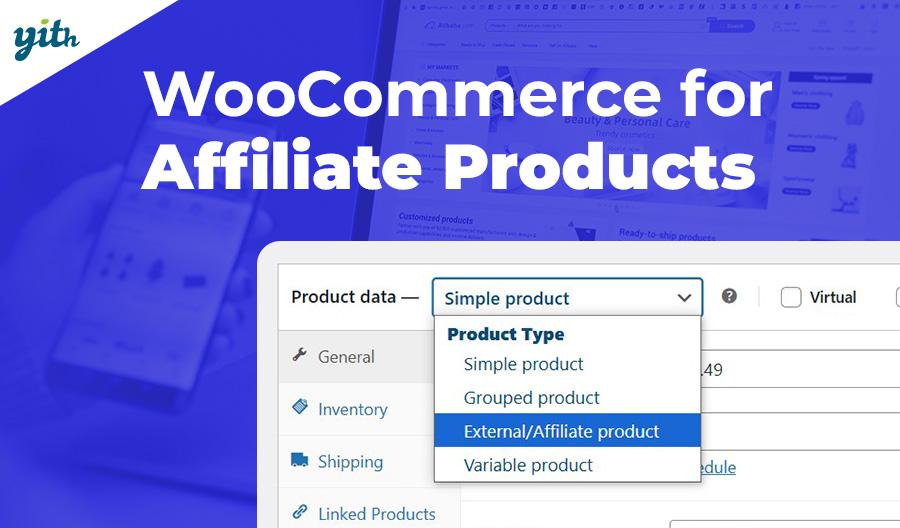When launching a startup, there are several factors to consider, including understanding how to invest with a limited budget. Among the various options available to those starting their own business, one of them is the creation of a website (both in the traditional format and as an eCommerce platform).
Having an online presence has become more essential than ever. Whether it’s for selling products or services, or simply for the sake of image, transparency, and authority, being visible online is a must.
A quick online search will present the aspiring webmaster with several options to choose from. Hundreds of guides recommend one Content Management System (CMS) over another, and among the various alternatives, WordPress and WooCommerce stand out.
WordPress is indeed the most widely used CMS in the world, and WooCommerce allows you to effortlessly transform a website built on this platform into an online store with just a few clicks (and for free).
The question that naturally arises at this point is: Is WooCommerce a good option for your website? And why?
In this article, we will analyze in detail the reasons why millions of startups choose WooCommerce. However, this can be summarized as: WooCommerce is a free tool (low initial investment), easy to use and learn (no technical knowledge required), highly customizable and flexible (to shape any type of website that best suits your needs).
Of course, there are other motivations, which we will explore in the next section of this guide. For now, a few numbers to keep in mind: over 6 million websites currently use WooCommerce, there are over 4,000 plugins (both free and paid) to add special features to your online store, and in 2020, WooCommerce generated over $20 billion.
This achievement is clearly justified by the key benefits of WooCommerce — let’s explore what they are.
Table of contents
-
Key Advantages of WooCommerce
- The Freedom of Free Services
- How to Get Started with WooCommerce at No Cost
- Online store flexibility
- Sale of Physical and Digital Products
- Customization of the Online Store
- Ease of Use and Management
- WooCommerce User Interface
- Excellent Integrated Analytics Tools for Every Startup
- Security and Community Support
- Scaling WooCommerce for Growing Startups
- Conclusion
Key Advantages of WooCommerce
There are many advantages to using a particular tool, and they usually become evident during its use. However, here is a list of the benefits that WooCommerce offers for a startup’s eCommerce store.

The Freedom of Free Services
Managing expenses is one of the most critical aspects for a startup. During the initial phase of establishing an eCommerce business, there is often a limited budget available and, at the same time, there is uncertainty about future revenues.
Many professionals are often hesitant about creating their own online store due to the hidden expenses associated with the project. This fear frequently leads them to delay their plans.
What are the costs to consider for an eCommerce store? Aside from the traditional ones related to purchasing products, an online store comes with three types of expenses:
- Initial investment – The cost required to start an online business can vary significantly, especially if one decides to rely on an agency for creating the website. This initial investment may differ depending on various factors, such as the complexity of the portal and the services provided by the agency.
- Recurring costs – These include both the monthly and annual costs associated with running a website. This is one of the most common expenses, as we will explore later on.
- Sales commissions – When selling a product or service online, it is important to consider not only the fees charged by the payment method (such as PayPal) but also those that the eCommerce platform itself may charge.
Some online CMS options actually take a small fee on each sale, which has a significant impact in the long run, especially for stores that sell low-value products.
In light of these concerns, how does WooCommerce perform?

How to Get Started with WooCommerce at No Cost
If you want to create an online store using WooCommerce free of charge, I have both good and bad news for you. The bad news is that it’s not possible to create a store in WooCommerce without spending anything, as you still need to consider the cost of hosting services. However, the good news is that there are affordable web hosting options available for your eCommerce venture with WooCommerce.
The good news is that this cost is the only one that is truly mandatory, and you can still minimize it.
In fact, the WooCommerce platform does not have any subscription or recurring costs and does not charge commissions on the sale of your products. There are paid plugins and themes available (usually of higher quality), but even in this case, you can be selective and choose only the essential ones (and you can postpone this decision, starting with free solutions).
When it comes to the cost of hosting, it varies greatly depending on your needs. A store with millions of monthly visits and a huge volume of business will certainly require a more powerful infrastructure compared to an amateur blog.
Fortunately, you can start with a less powerful solution and then upgrade later based on the growth of your startup. Nowadays, there are hosting services that offer excellent solutions for small and medium-sized stores at a minimal annual cost. In this regard, we recommend our article comparing the best hosting options for WordPress and WooCommerce.
Regardless, WooCommerce remains one of the most cost-effective solutions available. Both WordPress and WooCommerce are completely free, and there are tens of thousands of free resources available online (but we’ll discuss this further in the next point).

Online store flexibility
Another vital aspect for startups is the flexibility of the platform. Why is it important? It has an impact in two aspects:
- Startups have a tendency to evolve over time. In the initial stages, there is an experimental phase that leads to significant changes in the business model. This is why there is a fear of creating a fixed and immovable online store that may become unsuitable after a few months.
- Startups have a tendency to grow over time, which means that a portal capable of growing with our business is required. This has an impact both in terms of scalability and in terms of additional functionality.
How does WooCommerce behave in this regard? Among the various options available online, WooCommerce is undoubtedly one of the most flexible and customizable eCommerce platforms.
This is because the WordPress/WooCommerce combination allows you to easily create a self-sufficient online store, but it does not introduce highly specific or advanced features within it.
To achieve this, you can use any number of the tens of thousands of plugins available from the vast WordPress and WooCommerce community. These plugins range in functionality, from those that allow you to create multilingual websites to those that transform your store into a marketplace like Amazon.
The only limit in this case is your imagination. Furthermore, most of these resources are free, giving you the opportunity to experiment with them and potentially invest in advanced plugins as your budget increases over time.

Sale of Physical and Digital Products
A perfect example of WooCommerce’s flexibility is its ability to sell both physical and digital products without the need for any additional plugins. This eCommerce platform offers the convenience of selling a wide range of items, whether they are tangible goods or virtual downloads, all within its built-in capabilities.
Those who operate in this industry know that selling these two types of products requires different functionalities. Physical products, in fact, need a shipping system that calculates the costs to be paid by the customer. Not only that: inventory management is among the most important functionalities in this case.
When selling digital products, both of these aspects become irrelevant. Instead, it is necessary to provide the option to download the product without requiring the seller to send multiple emails to their customers.
WooCommerce encompasses all the functions we have already mentioned. Moreover, it already includes a customizable communication system, allowing you to decide what to write to customers based on their actions on the website.
Clearly, certain types of digital products will require advanced functionalities, but these can be easily introduced through plugins. For example, if you intend to sell online courses, you can use plugins like Membership and Subscription, which will allow you to create exclusive content accessible only after subscribing to a recurring payment that you can fully customize.
As we have said before, WooCommerce is one of the best eCommerce platforms in terms of potential, thanks to its endless flexibility.

Customization of the Online Store
We have discussed the possibility of getting extra features with additional plugins, but customizing WooCommerce goes beyond that. From a visual standpoint, for example, you can choose the appearance of your WordPress website so that it aligns perfectly with the business model you want to create.
To achieve this, you can use themes: themes, similar to plugins, are external components that you can install on your WordPress site. However, instead of adding functionality, they focus on altering the visual appearance of the site.
A journalistic website will have different graphic choices compared to a butcher shop, just as a hotel booking business will need to use different colors compared to a non-profit organization.
In this regard, you have a plethora of options to choose from. In 2022, it was estimated that there were over 31,000 themes available on WordPress, categorized into both free and paid solutions (WordPress itself offers some free solutions to help you build your site). With such a wide range of choices, you are sure to find the perfect theme for your needs.
Clearly, not all of these themes fully support WooCommerce, but you won’t have any difficulty finding one for your startup.
Thanks to the use of themes and plugins, you’ll be able to customize your website without any programming knowledge. However, for those who are familiar with programming languages, WordPress is an Open Source resource so they can customize the site’s behavior and appearance even further.
Additionally, finding developers to request this type of modification is extremely easy, thanks to the massive community behind this CMS.

Ease of Use and Management
As mentioned earlier, WordPress and WooCommerce do not require any technical knowledge to start using the website. Both eCommerce platforms come with a guide that will assist you in getting started and it will only take a few days to become familiar with every aspect of the site.
Certainly, there may be other CMS options that are even easier to use, but it is important to remember that WordPress has millions of users worldwide, including both young and elderly individuals.
The entire interface revolves around a promise of user-friendliness, making it one of the defining features of this CMS. The interface is indeed intuitive and user-friendly, using a logical content distribution system with an easily navigable sidebar menu.
The installation process for themes and plugins is quick and easy. Not only can you search for them within WordPress itself and install them with a single click, but if you purchase them externally, you can simply upload the compressed folder in the dedicated section.
To sum up, even if you lack experience in creating and managing websites, WordPress remains a practical and easy-to-learn solution.

WooCommerce User Interface
WooCommerce shares the same philosophy as WordPress, providing a comprehensive yet user-friendly interface. Within your online store, you will find a dashboard that offers a complete overview, including sales, pending orders, and user reviews. The goal is to simplify the process while still providing all the necessary information for managing your store effectively.
You will be able to manage all your products with a consistent and easy-to-follow creation process. Once you get the hang of it, you can add a product to your store in less than two minutes.
WooCommerce also provides excellent analytics tools, along with numerous plugins that will give you a comprehensive view of your store’s performance.
In summary, you will be able to configure every fundamental aspect of an eCommerce store: from creating and managing products (like setting prices and the number of items in stock) to handling shipments by creating different shipping zones and prices based on the buyer’s location; from setting the payment options (including adding multiple payment methods thanks to specialized plugins) to managing reviews by implementing diverse marketing and sales techniques.
All of this should reassure those who fear the transition from a traditional website to an online store, expecting advanced and complicated functionalities: all you need is a little experience with WordPress to be able to independently manage your eCommerce website. Rest assured that you can handle it with ease and confidence.

Excellent Integrated Analytics Tools for Every Startup
In the previous point, we mentioned the analysis tools that can be used in WooCommerce, but these deserve a separate mention as they are essential for the success of a startup.
Especially during the initial phase of launching, it is crucial to have a comprehensive understanding of the business’ performance. This includes both the most sought-after products and the behavior of users, as well as the source of the traffic that will come to your website.
In addition to WooCommerce Reports, which already provide a comprehensive and detailed overview of your store’s performance (including sales, revenue, conversion, and much more), numerous additional plugins can shed further light on your store. These plugins serve as useful add-ons and can provide additional insights into your store’s performance.
Many sellers use Google Analytics and Jetpack extensively. The former enables the use of Google’s suite, providing a broader understanding of user behavior and website traffic. This is ideal for implementing growth and conversion strategies. The latter is an additional solution that helps monitor website usage and user behavior.
Besides these, you can find numerous other options to meet your specific needs.

Security and Community Support
One of the concerns associated with using a CMS like WordPress is the issue of support and security. For instance, you won’t have direct support from developers in case of issues (this is usually offered as an alternative with a higher monthly cost). Additionally, it’s not uncommon to come across articles online that highlight alleged security vulnerabilities in websites built with WordPress.
Is all this an obstacle for your startup?
Let’s start by saying that, even though there is no direct support, you will definitely not be alone in facing the difficulties that may arise when creating and managing your website. In fact, the WordPress community is one of the largest and most cohesive communities in the world, with millions of people publishing content online daily (including guides, videos, and more) and answering their colleagues’ questions. This bonding has even led to recurring in-person events (WordCamps) worldwide, where people can meet and get to know each other.
For this reason, most of the issues you might encounter can be resolved with a quick online search. Even if you need direct assistance from a developer, it will be easy to find someone among the thousands of specialized programmers in this field.
When it comes to security, the vast majority of vulnerabilities that arise in a website built with WordPress and WooCommerce are caused by errors made by the site owners. It is crucial to keep both WordPress and the themes/plugins you use updated, as these continuous updates ensure the site remains secure and up to date.
These updates can be processed with a simple click, which is why it only takes a little attention to significantly increase the security of your website.

Scaling WooCommerce for Growing Startups
Finally, it is important to discuss the possibility of scaling the website as your business grows. As mentioned earlier, a website that needs to accommodate a hundred users per month and a website that needs to accommodate a million users clearly have different server requirements.
While there are online solutions like Shopify that excel in scalability, WooCommerce (and WordPress by extension) is no less capable. The only difference is that you will need to upgrade the hosting service previously chosen.
In this regard, you can select a hosting service that already includes the ability to scale over time among its features.
Clearly, purchasing a higher-level hosting will come with a higher investment, but this will not be a problem thanks to the growth of your business (and usually it is still lower compared to other dedicated services anyway).
Conclusion
WordPress and WooCommerce are a winning combination for startups because, just like your emerging business, they are powerful tools with high potential that can grow alongside your business.
The easy approach and simple management of the website will allow you to create an online store without relying on external agencies, with the ability to introduce functions over time thanks to the flexibility of this CMS and the numerous plugins available online.
We recommend that you give it a try, especially considering its low initial cost, to personally test the effectiveness of this tool.



